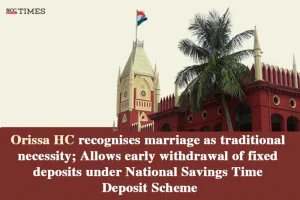Orissa High Court: In the present petition, the petitioner challenged the refusal to permit premature closure of her fixed deposits, wherein she was denied access to her own funds despite an urgent need arising from a marriage in the family. She submitted that premature encashment was not completely barred under Rule 8(d) of the National Savings Time Deposit Scheme, 2019 (‘2019 Scheme’), and thus warranted consideration.
A Single Judge Bench of Dixit Krishna Shripad, J., while allowing the petition, observed that the funds in deposit belonged to the petitioner and not to the entity holding the money, since, ordinarily, the owner of a thing was entitled to make use of it in any way he or she desired, unless the law provided otherwise.
Background:
The petitioner had invested in five fixed deposits under the 2019 Scheme, each with a tenure of five years. She sought permission to prematurely encash these deposits due to an urgent financial requirement, namely a marriage in the family, while submitting that premature encashment of the fixed deposits was not completely embargoed and therefore should be permitted. However, her request was denied by the authorities under Rule 8(d) of the amended 2019 Scheme, as per the Notification dated 07-11-2023.
The petitioner argued that Rule 8(d) of the 2019 Scheme did not impose a complete prohibition on premature withdrawal. She contended that she was in genuine need of funds for a traditional necessity and that the rule should be interpreted in a manner that allowed such withdrawal.
On the other hand, the opposite parties contended that Rule 8(d) of the 2019 Scheme clearly permitted premature withdrawal only after four years from the date of deposit, and since the deposits had not reached that threshold, the petitioner was not entitled to encash them.
Analysis and Decision:
After hearing both sides and examining the petition, the Court found merit in the petitioner’s plea and observed that she was in urgent need of funds for a marriage, which was recognised under Hindu Law as a traditional necessity. Emphasising the petitioner’s situation, the Court stated that it could not be gainfully argued that she had no pressing need for the funds. Further, the Court observed that the funds in deposit belonged to her and not to the entity holding the money, since, ordinarily, the owner of a thing was entitled to make use of it in any way he or she desired, unless the law provided otherwise.
The Court analysed Rule 8(d) of the 2019 Scheme, which stated that where a deposit in a five-year account was withdrawn prematurely after four years from the date of opening of account, interest should be payable at the rate applicable to Post Office Savings Account. The Court emphasised that the provision in question was not a Statute or Act but rather a form of subordinate legislation, which needed to be interpreted with a degree of leniency, as availed by its very text. The Court further observed that it did not begin with negative phraseology such as “No premature encashment/withdrawal of deposit was permitted.”
On the contrary, the Court noted that Rule 8(d) of the 2019 Scheme specifically provided for premature encashment. The Court observed that the thrust of the rule was on the rate of interest payable when the deposit is withdrawn after four years but before maturity. The Court, therefore concluded that a rule framed in such terms could not treated as putting a complete embargo against premature withdrawal. That said, the Court refrained from expressing any opinion on the rate of interest payable in the event of such withdrawal.
The Court therefore allowed the petition and quashed the letter dated 05-08-2025. Consequently, a writ of mandamus directing the authorities concerned was issued to permit the petitioner to withdraw the deposits within two weeks to facilitate the marriage ceremony. The Court further ordered that any delay in compliance would attract interest at the rate of 1 per cent per month, personally payable by the opposite parties.
[Priyadarsini Das v. Union of India, 2025 SCC OnLine Ori 3617, decided on 22-09-2025]
Advocates who appeared in this case:
For the Petitioner: Parsuram Panda, P.K. Satapathy & S. Pati, Advocates.
For the Opposite Parties: P.K. Parhi, DSGI with D. Golchhayat, CGC.

